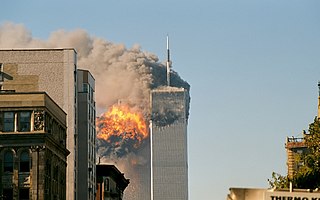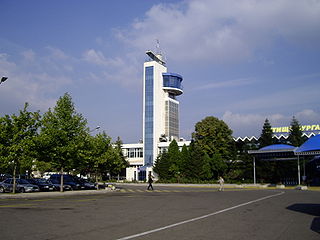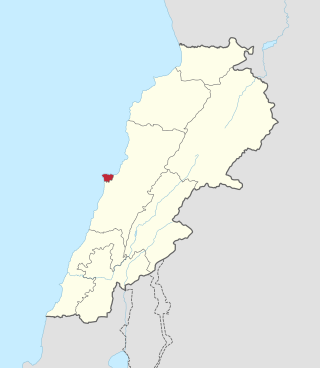Jund al-Sham is or was the name of multiple Sunni Islamist jihadist militant groups.

Terrorism in Saudi Arabia has mainly been attributed to Islamic extremists. Their targets included foreign civilians—Westerners affiliated with its oil-based economy—as well as Saudi Arabian civilians and security forces. Anti-Western attacks have occurred in Saudi Arabia dating back to 1995. Saudi Arabia itself has been accused of funding terrorism in other countries, including Syria.

Qaa, El Qaa, Al Qaa, Qaa Baalbek or Masharih al-Qaa is a town in Baalbek-Hermel Governorate, Lebanon. A 2010 report stated that population of the settlement was 500, all Lebanese Maronites.

A suicide attack is a deliberate attack in which the perpetrators knowingly sacrifice their own lives as part of the attack. These attacks are often associated with terrorism or military conflicts and are considered a form of murder–suicide. Suicide attacks involving explosives are commonly referred to as suicide bombings. In the context of terrorism, they are also commonly referred to as suicide terrorism. While generally not inherently regulated under international law, suicide attacks in their execution often violate international laws of war, such as prohibitions against perfidy and targeting civilians.

The Abdullah Azzam Brigades, or al-Qaeda in Lebanon, was a Sunni Islamist militant group, and al-Qaeda's branch in Lebanon. The group, which began operating in 2009, was founded by Saudi Saleh Al-Qaraawi and has networks in various countries, mainly in Egypt, Iraq, Syria, Jordan, the Gaza Strip and Lebanon.

The 2012 Burgas bus bombing was a terrorist attack carried out by a suicide bomber on a passenger bus transporting Israeli tourists at the Burgas Airport in Burgas, Bulgaria, on 18 July 2012. The bus was carrying 42 Israelis, mainly youths, from the airport to their hotels, after arriving on a flight from Tel Aviv. The explosion killed the Bulgarian bus driver and five Israelis and injured 32 Israelis, resulting in international condemnation of the bombing.
The Lebanese–Syrian border clashes were a series of clashes on the Lebanon–Syria border caused by the ongoing Syrian Civil War.

The 2013 Iranian embassy bombing in Beirut was a double suicide bombing in front of the Iranian embassy in Beirut, Lebanon on 19 November 2013. The two bombings resulted in 23 deaths and injured at least 160 others.
On 10 January 2015, nine people were killed and more than 30 wounded when two suicide bombers blew themselves up in a crowded café in Jabal Mohsen, Tripoli, Lebanon.

On 12 November 2015, two suicide bombers attacked Bourj el-Barajneh, a southern suburb of Beirut, Lebanon, that is inhabited mostly by Shia Muslims. Reports of the number of fatalities concluded that 43 people died directly from the detonation. Islamic State of Iraq and the Levant (ISIL) claimed responsibility for the attacks.
This article contains a timeline of events from January 2015 to December 2015 related to the Islamic State of Iraq and the Levant (ISIL/ISIS). This article contains information about events committed by or on behalf of the Islamic State, as well as events performed by groups who oppose them.

On 12 January 2016, a suicide attack in Istanbul's historic Sultanahmet district killed 13 people, all foreigners, and injured 14 others. The attack occurred at 10:20 local time, near the Blue Mosque and the Hagia Sophia, an area popular among tourists. The attacker was Nabil Fadli, a Syrian member of the Islamic State.
This is a timeline of events during the War in Iraq in 2016.
On 4 July 2016, four suicide bombs exploded in three locations in Saudi Arabia. One of these exploded in the parking lots of the Al-Masjid an-Nabawi, killing at least four people. The second and third suicide bombers targeted a Shia mosque in Qatif, but they failed to harm anyone but themselves. A fourth militant blew himself up after police tried to arrest him near the U.S. consulate in Jeddah. Two Saudi Arabian police officers were injured.

On 24 July 2016, fifteen people were injured, four seriously, in a suicide bombing outside a wine bar in Ansbach, Bavaria, Germany. The bomber, identified by police as Mohammad Daleel, was a 27-year-old Syrian asylum seeker who had pledged allegiance to Abu Bakr al-Baghdadi, leader of the Islamic State. He was the only fatality in the incident. According to German authorities, Daleel was in contact with the Islamic State and had been planning more attacks before his backpack bomb exploded accidentally.
On 3 June 2019, a gunman killed four security members—two police officers and two soldiers—in Tripoli, Lebanon. The attacker was a recent member of the militant group Islamic State (ISIS), but no group claimed responsibility for the attack. The attack took place when security forces were dispatched to the city's streets to ensure citizen safety at the end of the Ramadan and Eid al-Fitr holidays. The attacker was identified by the authorities and the Lebanese army as Abdel Rahman Mabsout; he was a former ISIS member who had participated in the Syrian Civil War against the Syrian government. He was detained and tried for fighting for ISIS when he returned from Syria in 2016 but was released after a year in jail in late 2017.









